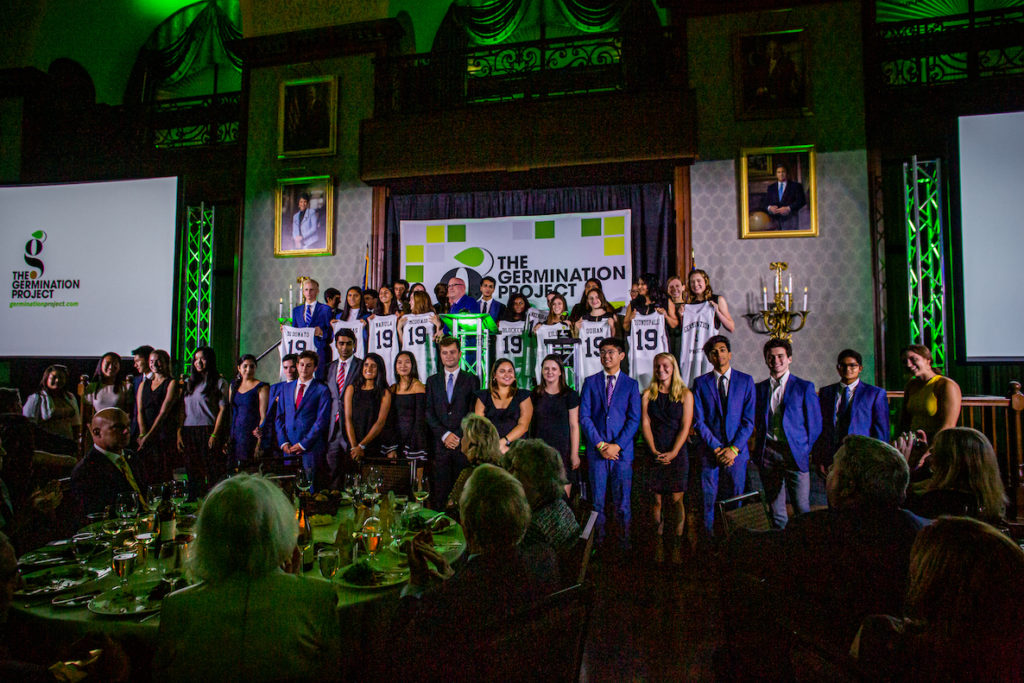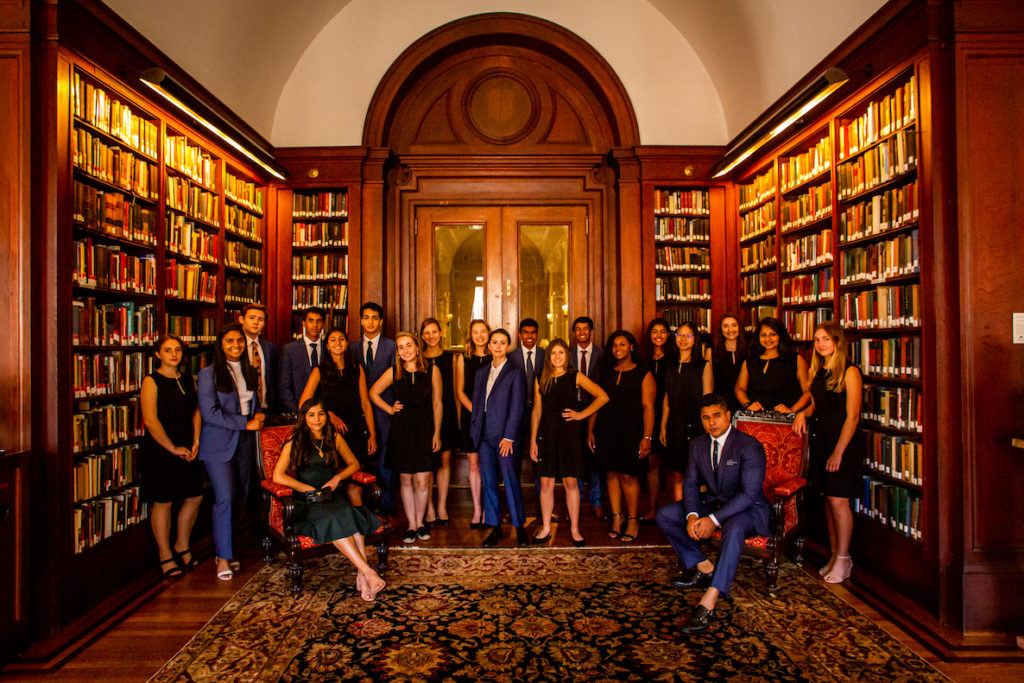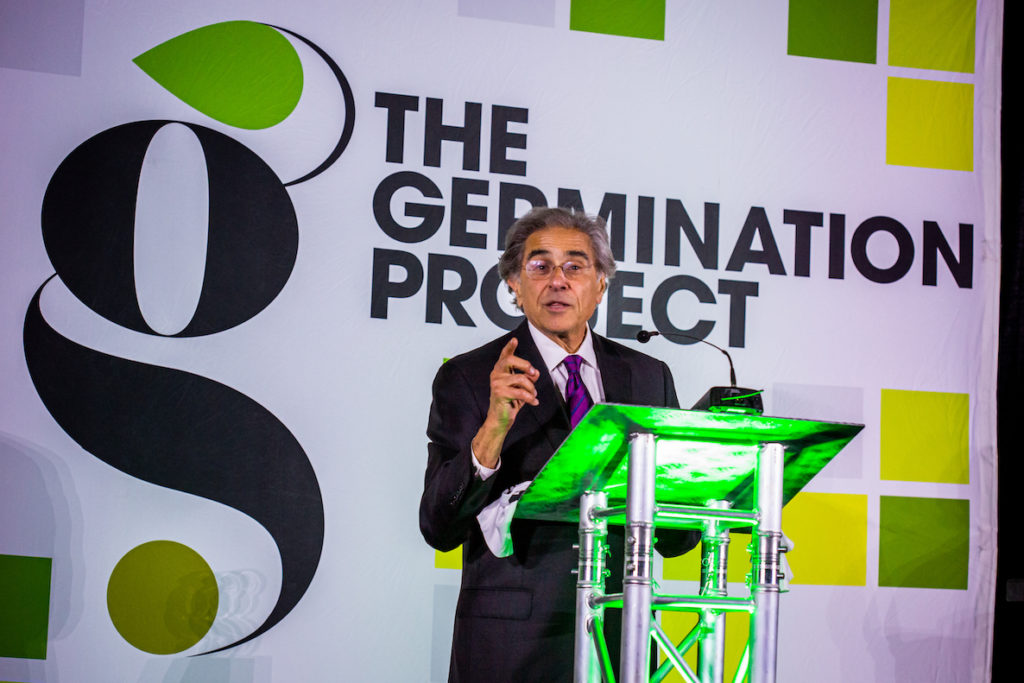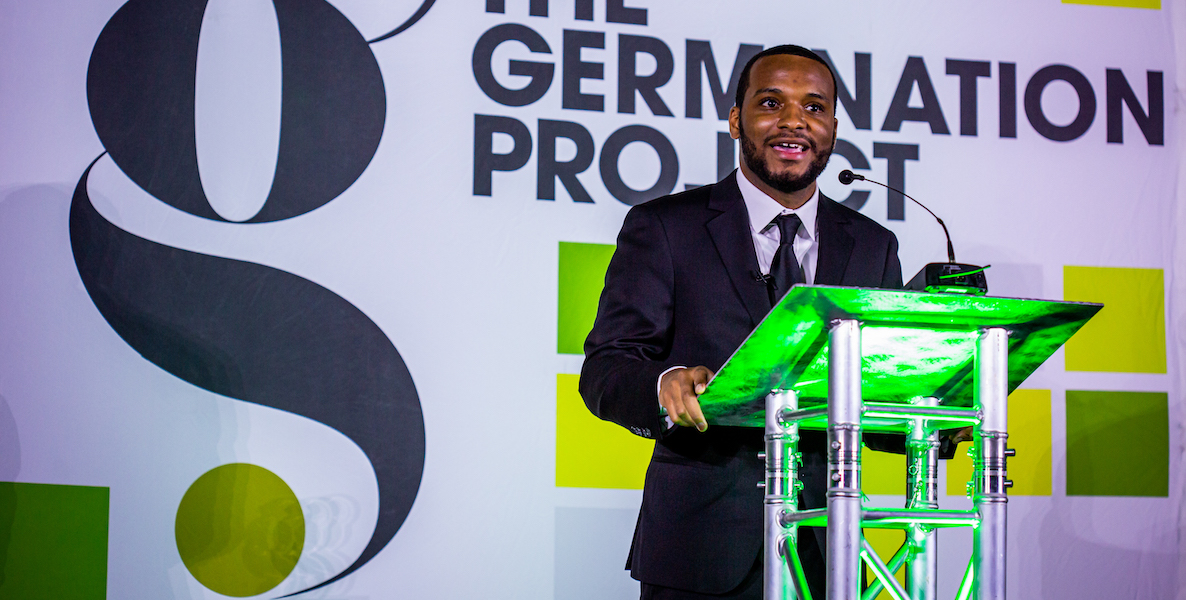Check out Hardeman's speech
A Place to Stand
By Hazim Hardeman
Good Evening,
First, I’d like to thank the Germination Project, Ajay and Pamela [Raju], tonight’s draftees for allowing me to be a part of your special day, and the event and catering staff who’ve made it possible for us to enjoy this evening. Can we give them a round of applause?
One of the most important pieces of advice I’ve ever received came after I won the Rhodes from someone that I respect and admire deeply for being a serious thinker and scholar. She told me: “There’s a tendency for younger scholars to come out before they’re cooked,” especially in our current moment where fame is the driving pursuit and in a culture where smartness subordinates wisdom.
Ever since then I’ve tried to take that seriously and not become complicit in that tendency. I mention this to confess that, although honored, I accepted the invitation to speak tonight with some reluctance, as I realize that there’s still much that I’ve yet to figure out. But if I can talk about one thing, it’s the path that’s led me to stand in front of you all today. So with my remarks, if you’ll allow me, I’d like to share something different from, and hopefully deeper than, the inspirational platitudes that such an occasion usually calls for.
When I first met with Ajay and we discussed the possibility of me giving the keynote, I was so inspired that our conversation naturally ended up on an idea that I had been thinking about for some time, and that’s this idea of “finding a place to stand.” Without mentioning that I had been reflecting on this and hoping to share my thoughts, he told me about one of the best commencement speeches he had ever heard, in which a Jesuit priest rose before a graduating class and said these eight words: “Find a place to stand, and stand there,” before taking his seat. Now, I thought about doing the same thing today, but I think we agreed that I’d be paid by the minute, so I’ll take a bit more time. (I’m just kidding). But if there is a theme that I want to share with you today, that is it: Finding a place to stand.
The Greek mathematician Archimedes is believed to have said: “ Give me a place to stand, and I will move the Earth.” As many of you know, just over a month ago we loss one of the greatest thinkers this country has ever produced: Toni Morrison. While we mourn this loss, we also celebrate all that she’s left, and one of the things she left us is some sense as to how we might move the world by finding a place to stand. In a 1998 interview about her work and her receiving the Nobel Prize in literature, Morrison, famously known for giving attention solely to black characters in her writings, was asked by an Australian journalist if she’d change this approach and write books that incorporate white lives substantially so that she might enter the mainstream.
Morrison replied by pointing out how powerfully racist the question was because, as she said, you could never ask a white author, “When are you going to write about black people?” She stated that “even the inquiry comes from a position of being in the center and being used to being in the center, and saying is it ever possible that you will enter the mainstream?” “It’s inconceivable,” she added, “that where I already am is the mainstream,” before declaring: “I stood at the border, stood at the edge, and claimed it as central, claimed it as central, and let the rest of the world move over to where I was.”
What I take Morrison to mean is this: Our place to stand exist in our traditions, lived experiences, our stories and we must tell them as if they were central, because they are, and if we are to move the world, we must demand that the world move to us.
I want to make this point clear by telling a story, but first I’d like to reflect a bit on what this has meant to me. When I think of the place I’ve been given to stand I most immediately associate it with the intellectual and scholastic traditions out of which I come, primarily with university figures. But everything for me begins with my mother, who never went through a university but a university could’ve went through her. In her words and deeds, she taught me to challenge those things which seem unquestionable and inescapable, encouraging me that they only seem unquestionable and inescapable—until someone questions them and thereby escapes them. One of those truths she challenged was that a child’s life should be circumscribed by their zip code. Since having the fortune of sharing my story, a lot has been made of the fact that my mother lied about our zip code so that my brother and I could attend a more resourced school outside of our neighborhood. And to some surprise, her decision, the same decision for which one too many parents have paid the price of their freedom, has been praised. But amidst the applause, we should never cease to question why a mother must make such a choice in the first place
The lessons she taught me would stick with me throughout my education as I sought to challenge received wisdoms. In my final semester at Temple University, this led me to Graterford Prison. There, every Wednesday, I took a class with incarcerated students. I went into the experience with the abstract belief that in spite of their circumstances there was so much I can learn from. But it wasn’t in spite of their circumstances, it was because of them—it was precisely because they were among the most vulnerable, disregarded and disposed of, consigned to cages that they had so much to teach us, to teach the world. One of the things they taught me is that we desperately need to rethink our notions of justice. They recognized what the Christian theologian Reinhold Niebhur did when he said: “Any justice which is only justice soon degenerates into something less than justice”—that justice needs to be rooted in something deeper. So that we don’t just ask who did it and how can we punish them, but who was hurt and how can we make them whole.
I share this to say: we all have a story to tell and a place to stand. Indeed, it’s because we have a story to tell that we have a place to stand. But although our stories may be individual, they are never individualistic. We all thrive in conditions not of our own making. After all, germination presupposes a fertile soil.
I’m reminded of another person who helped me find my place to stand. His name was John Raines. John Raines was a professor at Temple for over 40 years and I was privileged to be among his last students. That this extraordinary tenure as an educator doesn’t even begin to capture the grandness of his life speaks to the man he was.
He was also an activist and a whistleblower. On March 8, 1971, while the nation was captivated by the historic boxing match between Joe Frazier and Muhammad Ali, John and his wife Bonnie Raines broke into the FBI field office in Swarthmore on a hunch that the bureau had been illegally spying on anti war and civil rights activist. What they uncovered would come to be known as COINTELPRO, a series of campaigns to harass and intimidate civil rights leaders, including Martin Luther King Jr. It would take him 43 years to claim responsibility for the break-in, proving that his pursuit was principle not popularity.
All of this was unbeknownst to me when I took his class. I simply knew him as my professor, whose wisdom I would marvel at and whose peculiarities would make me chuckle. I was so enthralled by his wisdom that I began to keep a record of his little sayings. I called them Rainesisms. Some of my favorites included his series of provocative inquiries: “What is fashion fashioning?” “When you put on make up, what are you making up for?” Or his pithy observation that “What we consume, consumes us” or his sharp critique, appropos to this idea of a place to stand, “Capitalism has wings but no feet, and that’s its moral problem.” But my personal favorite is his reflection on why the many remain divided against the few—because “We dream up, but blame down.”
These profound wisdoms would be interspersed with moments of levity. I can remember one moment in particular. He would do this thing where he’d go around the class and ask students “how many bathrooms did you grow up with.” And we’d all be confused, but we’d go along. And my classmates would respond 2, 3, 4, 3, 5, then he’d get to me and I’d say “one, and I’d be lucky if it was functioning properly.} And he’d look at me with this huge smile and say “Congratulations.” And I’d just laugh in my confusion, chalking it up to the quirks of senescence, to the peculiarities of growing old.
But what I understand now that I couldn’t understand then about why he’d congratulate me on having the least amount of the bathrooms among my classmates is this: that what others might perceive as lack, he understood as abundance, because more than anything, my experiences growing up gave me a place to stand.
I received the last letter of recommendation he ever wrote. In it here what he wrote to the Rhodes Scholarship Committee: “I do not think your scholarship committee will be confronting or be confronted by an organic intellectual in the making with this kind of promise or passion.” [In our class], “His became the voice we needed to hear but would not have heard without him.”
I only realized how much he meant to me after it was too late. He didn’t get to see me win the Rhodes. He died a week before. But I suspect that he knew I’d win all along. And this suspicion has to do with his understanding of the place that I’d been given to stand.
I want to end by sharing with you a painful story. It’s one I hesitate to share. But I know we can’t run away from pain if we are to heal. A week before I was set to leave for Oxford, I gave one last interview in the neighborhood that I grew up. Just before the interview was about to wrap up, I stood on the same corner I’d stood on for many days and many nights while the three journalists conducting the interview asked my friends questions about what my achievement meant to the neighborhood. Before they could finish answering, nine shots rang out, some of them hitting my childhood friend who was just feet away from me, while others narrowly missed me and the journalist.
As was written in the final article recalling this day, having escaped the hail of bullets, I was off to Oxford University from Temple, while my friend was off to Temple University Hospital. This painful experience was compounded in the coming days by my somber recognition that for nearly all of the people who come from my neighborhood, this is the only way they’d ever be admitted to the university—through its hospital.
As I said earlier, our stories are central. This means my pain is not remote from, but connected to yours. Recognition of this is critical, because of the basic physiological fact of which James Baldwin reminds us: “That the pain which signals a toothache is a pain which saves your life.” In other words, We all suffer if a kid from North Philly has a better chance of meeting their end at Temple University Hospital, rather than their beginning in a Temple University classroom. Therefore we must tell our stories, because in doing so we can not only move the world but save lives. And it is in these stories that we find our place to stand, which has already been marked. Its is our duty to find it and stand in it.
Thank You

![]() It’s a long-term bet that began four years ago, with the first crop of Germination fellows—now college juniors—who committed not only to two years of Germination programming while in high school, but to returning home after college to continue their work in Philadelphia.
It’s a long-term bet that began four years ago, with the first crop of Germination fellows—now college juniors—who committed not only to two years of Germination programming while in high school, but to returning home after college to continue their work in Philadelphia.
![]() But it was something Hardeman said early on, inspired by a conversation he had with Raju leading up to the event, that most resonated for our times—words that the well-heeled crowd of Philadelphians found themselves repeating at the end of the night.
But it was something Hardeman said early on, inspired by a conversation he had with Raju leading up to the event, that most resonated for our times—words that the well-heeled crowd of Philadelphians found themselves repeating at the end of the night.





